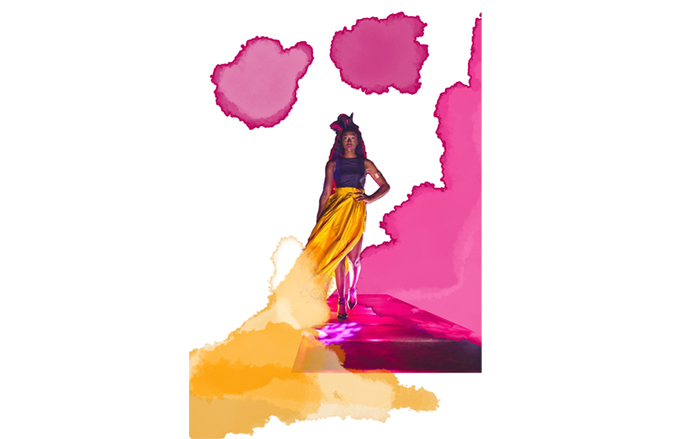By Hannah Crooks
hannah-crooks@uiowa.edu
The Flyover Fashion Fest is back Friday and Saturday, and in light of the 2016 election and the current sociocultural landscape, the festival, now in its second year is more politically charged than before.
“Flyover Fashion Fest is a two-day fashion, music, and art festival in downtown Iowa City that features emerging fashion and creative talent in Iowa and from across the country,” creator Simeon Talley said. “We do that through a really cool mix of events: runways, fashion shows, speakers, panels, exhibitions, film, and so forth.”
Talley, also a cofounder of the Iowa Fashion Project, which produces the festival, aimed to curate a complete festival experience from beginning to end. He achieved the goal by combining fashion with cultural, social, and political issues.
“There are real ideas, values, opinions behind everything that we’re doing, even the speakers and the designers that we’re choosing to work with,” Talley said. “They have something to say about fashion, about the world we live in; they have a point of view. There’s kind of a political, social theme that connects all the different programming this year.”
Many of the speakers will discuss fashion’s tie to the political realm, including music, style, and culture writer Marissa Muller. Currently the West Coast trending editor in Condé Nast’s social-news division, Muller writes for major publications such as Teen Vogue, Vanity Fair, and Glamour. Her talk will specifically focus on “when fashion got so political” and how the always-present governmental concerns affect the media and fashion industries.
“There is no doubt whether this past election cycle has significantly impacted the media landscape,” Muller said. “Before the Trump administration threatened fundamental human rights for women, the LGBTQ community, and immigrants — not to mention the environment — the news stories that hit were overwhelmingly celebrity-focused. Now, however, people want more from their news than a report about what a celebrity wore to run out to the grocery store.”
Another speaker will touch on fashion politics but with a larger focus on personal identity and female empowerment. Activist and journalist Noor Tagouri collaborated with Lis’n Up Clothing to create a clothing line that focuses on reclaiming the power of women and combating sex trafficking. She creates a platform on which fashion and advocacy can be joined.
“[Fashion] is an expression of a person’s identity, insecurity, vulnerability, confidence, and everything in between,” Tagouri said. “My sense of style has always been an outward projection of what I am going through or what stage of my life I am in at the moment. [Fashion can be a form of advocacy] by embracing your identity through fashion and respecting other people who do the same.”
In addition to individual advocacy, body-image expert Virgie Tovar, who will discuss the plus-size revolution on Saturday, believes that the fashion industry as a whole can take steps toward greater inclusiveness.
“I think one big thing is having models, people who are showing the clothes, in not only a variety of sizes but shapes as well,” Tovar said. “Even in plus-size representation right now, there is a specific body type that is consistently shown — very busty, small waist, larger hips — that sort of Coke bottle shape. Diversity of shape is really important.”
Greatly influenced and liberated by feminism and fat activism, Tovar learned about these subjects during her college years. Understanding that education is not accessible to everyone, she worked to create something that would educate as many people on the issues as possible. The result was a program called Babecamp.
“Babecamp is specifically for women who want to break up with diet culture,” Tovar said. “A lot of women don’t enjoy dieting, but they feel like they have to do it. So this course is really about understanding the history of diet culture, and what it is, and why and how it affects women’s lives. It really encourages women to recognize that nobody gets to control what they eat or what their body looks like.”
Tovar emphasizes that feminism and fat activism relate to one another and that diet culture shames and controls women more than it helps them.
“Fat activism is essentially being led largely by women, and I don’t think that that is an accident,” Tovar said. “Feminism, at its core, is about full humanity for women. And I think fat activism is about full humanity for people of all sizes, in particular, fat people. I think they share that goal of liberating people from unacceptable social expectations and allowing them to live a self-directed life that is based in justice and autonomy.”
Autonomy — and a desire for revenge after a bad break up — is what spurred designer Nicole Leth to build her own fashion line called Sex & Ice Cream when she was only 18 years old. Sex & Ice Cream, which now has store locations in Kansas City, Missouri, and Des Moines, also partners with Planned Parenthood by giving proceeds from certain item sales to the organization.
Leth, who describes her designs as her “visual diary,” will début her spring collection at the festival on Friday night. Her spring collection is unisex and inspired by the intensive construction work and many trips to Home Depot that were involved in the building of her new Des Moines store.
“The new spring collection is a line of intentionally designed work-wear that is for people who society doesn’t really expect to be able to do work,” she said. “Every day, I was wearing overalls or workwear, and I had to go to farm stores or the men’s section to buy them. I started thinking about how I wanted to design workwear for people like me, who do work just like the rest of the people in the world, who also want to feel comfortable and cute doing it. And it comments on the political climate as well, but in a very design-oriented way.”



